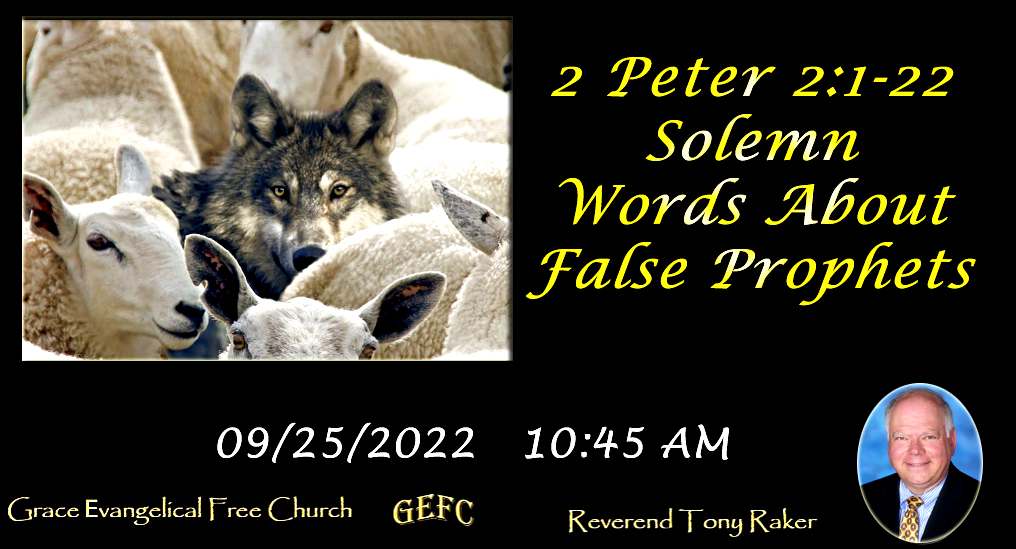
Solemn Words About False Prophets
2 Peter 2:1-22 Solemn Words About False Prophets
There were false teachers in Old Testament times, in the days of the Prophets and Jesus warned that this would be the situation through this present day (Matthew 7:15; Mark 13:5, 22). The Apostles also warned times would get darker with false teachers proliferating the Church, causing havoc (Acts 20:29; Gal. 1:8-9; 2 Timothy 4:3-4; Titus 1:10-11; Jude 4).
2 Peter 2:1: “But false prophets also arose among the people, just as there will be false teachers among you, who will secretly bring in destructive heresies, even denying the Master who bought them, bringing upon themselves swift destruction.”
- Grammatical Usage: “false prophets” on the Greek, “pseudoprophétés” meaning, “pretender; imposter; specialist in the art of misimpression”; “destructive” or “apóleia” meaning, “completely severed; cut off; loss of wellbeing”; “heresies” or “hairesis” meaning, “subjective, specific, divisive opinion”.
- Literal Interpretation: “But even in those days there were false prophets, just as there will be false teachers among you today. They will be men who will subtly introduce dangerous heresies. They will thereby deny the Lord who redeemed them, and it will not be long before they bring on themselves their own downfall.”
- Contextual/Comparison: God keeps His Word: God continually uses His Word.
- The warning that we are to expect false teachers in Christendom
The word ‘Christendom’ refers to the professing Church, constituted of all who profess to be Christians: that is, those who confess Jesus as Lord and Savior. The warning is in vv. 1-3, where false teaching is described as “destructive heresies”. Any teaching that is contrary to the Bible is a destructive heresy:
(A) Roman Catholicism: with its false teaching about the Godhead, the Church, the Pope, purgatory, the priesthood, and its emphasis on works rather than faith for salvation.
(B) Spiritism: which often presents itself to the unwary as ‘Christian’ teaching.
(C) Seventh Day Adventism: with its erroneous teaching about law-keeping.
(D) Christadelphianism: with its denials of the revealed gospel of Christ and of the Person of Christ Himself.
(E) Mormonism: which is so contrary to the Scriptures.
(F) Christian Science: with is neither scientific nor Christian.
(G) Unitarianism: which denies the full deity and saving grace of Jesus Christ.
(H) Jehovah’s Witnesses: whose teaching is quite contrary to the gospel.
We must also mention Liberalism, which teaches a blatant denial of the truth (Jude 3). We cannot fail to realize that there are many holding high positions of responsibility in the Church, and in our colleges, who deny the inspiration and authority of the Bible and the fundamental truths of the Faith; teaching their own ideas and fanciful interpretations. They reject divine revelation and substitute human speculation. Let us be aware of these great perils, and by all means let us pray for those who teach false doctrine.
- The characteristics of false teachers
The false teachers spoken of here are not so much those who are teaching false doctrine out of ignorance, but those who know the truth and deliberately teach error. What are they like? Notice the following description:
- They are cunning, as the word ‘secretly’ means ( 1). (B) Their chief sin is that they deny the Lord (v. 1). (C) They hinder ‘many’ (v. 2), (D) They are covetous (v. 3) or religious racketeers. (E) They are proud, self-willed, presumptuous, and sometimes immoral (vv. 10; 18). (F) They love popularity (v. 18), they “entice”. (G) They are in dreadful bondage (v. 19).
- The fearful judgment that will fall upon false teachers
Peter does not hesitate to speak of the awful condemnation that awaits false teachers: “swift destruction” (v. 1); “has not been sleeping” (v. 3); “the unrighteous” (v. 9; vv.10-22). But there are three fearful examples of God’s punishment:
(A) The angels that sinned and who are now imprisoned in Tartarus (v. 4), the lowest depths of Hell. (B) The world before the Flood (compare Genesis 6:5-7). (C) The cities of the plain (compare Genesis 19:6-7; 24-25). These references are to actual historical events – how solemn!
- The need there is to be on our guard against false teachers
Those who propagate false teaching are constantly trapping the unwary. Notice again in v. 1 that they “secretly introduce destructive heresies…” They come into a church and gradually indoctrinate them (Colossians 2:8), and notice the following safeguards for the Christian, to avoid being led astray: (A) Ground yourself deeply in the Word of God (2 Timothy 2:15). (B) Be much in prayer (1 Thessalonians 5:17). (C) If any teaching is suspect, run from it, avoid it, beware of it, keep away from it (2 Timothy 3:5).
- The promise of escape from false teachers and teaching
There may be a wider application than this in v. 9, but all that the apostle says in the first part of this verse includes the promise of God’s delivering and keeping power. The illustrations are of Noah, who with seven others stood against the almost overwhelming current of their time; and of Lot, who though he made a bad mistake, proved the Lord’s gracious power to deliver. These words in v. 9 tell us:
(1) The Lord knows…
(2) The Lord knows how…
(3) The Lord knows how to rescue…
(4) The Lord knows how to rescue godly men…
(5) The Lord knows how to rescue godly men from trials…
- Conclusion: Are you a godly person? Then your rescue is sure.
